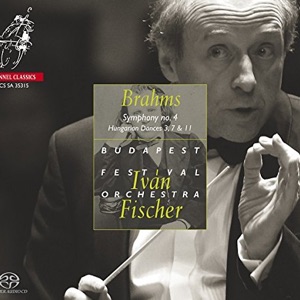Iván Fischer always has his Budapest Festival Orchestra playing at a very high level. The strings are sweet are silky, balances are true, and in the finale of the Fourth the presence of the trombones really makes itself felt. The symphony begins promisingly, at a nicely fluid tempo, but the energy doesn’t build as it should. As soon as we get to the transition to the second subject, a degree of lethargy sets in, and the movement never quite recovers. The problem is a subtle one; there’s no questioning Fischer’s good intentions and sensible decisions, but the result still comes across as curiously flat.
The Andante is played very beautifully, but again the focus is rather soft. Only the scherzo manages to sustain the necessary voltage. Unfortunately, the recording turns the movement into a triangle concerto. It’s always good to hear what Brahms wrote, even for this lowly member of the percussion family, but surely this takes matters too far. As just noted, the finale features some imposing work from the trombones, and like the first movement Fischer starts at what promises to be an urgent tempo, but the coda lacks ferocity and the final bars prove disappointing.
The couplings, three Hungarian Dances, don’t add anything special. Fischer includes a performance of the actual folk tune that Brahms borrowed for Hungarian Dance No. 3, and interesting as that is I would gladly forgo the lesson in ethnomusicology for a better performance of the symphony. There seems to be a tendency these days to treat Brahms with kid gloves, to play him prettily but dully. Fischer is one of the last conductors I would have expected to follow this trend, but there it is.
































